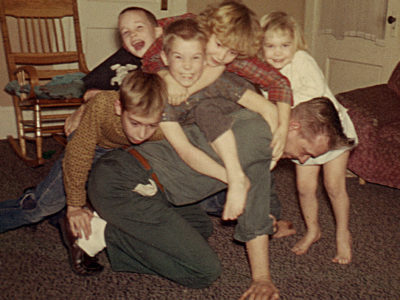DAD HAD BEEN FIGHTING non-Hodgkin’s lymphomia for 20 years when I got the call from Mom, 800 miles from where I lived in Kansas City.
By the time I arrived at Akron General Medical Center the next afternoon, doctors concluded that a viral infection had attacked Dad when his white blood cells were nearly depleted.
The chemotherapy Dad had taken temporarily stops the bone marrow from producing infection-fighting white cells. Dad’s struggle to survive was overworking his heart muscle, previously injured in a series of light heart attacks.
His condition became so critical that our family divided the days and nights, and kept watch over him. For a change, five offspring became an advantage.
My sister, Louise, stood with me in the hall as we gave Pam, the youngest of the family, time to sit with Dad.
“I know I should thank God for these 20 years,” she said, “but all I can do is ask for 20 more.”
I spent the night with Dad, sitting with my head two feet from his. He lay in the tight curl of an unborn child, yet he looked like a corpse discarded. Skin white and drawn. Face gaunt and misshapen, with the mouth closed on the right and opened a crack at the extreme left.
This is how he will look when he is dead, I thought.
His irregular breathing through the crack in his mouth sounded inhuman, like the raspy, artificial puffing of a respirator about to fail. I couldn’t possibly sleep.
During that night, I watched my father. I studied his form. It seemed as flesh, without a spirit. I wondered if he was leaving, before my very eyes. And I tried, without success, to remember a time I told him he had been a good father to me.
We had walked the walk, but not talked that kind of talk. Now, I feared, I might never get to speak the words.
From a Harley-riding grandpa who would burst onto the highway at heavy throttle, he had become in three months a near-corpse clinging to life by the thread of IVs feeding him nourishment, antibiotics, and blood.
When the first light of morning arrived, Dad woke. Together we watched the white shroud of fog slowly retreat from the hospital courtyard, and the first-shift workers scurry out of the cloud as they curled themselves around insulated cups of steaming coffee.
In the silence I tried to speak, but twice was overcome by waves of emotion that dissolved my words even as my lips began to move. On the third try, composed only enough to whisper, I talked the talk.
Dad wept quietly, saying he wishes he had been a better father.
I told him I know what he means because that’s how I feel about my kids. But we all do the best we can. And I wanted Dad to know that his best had been plenty good for me.
To the astonishment of everyone in our family, Dad survived the crisis by outlasting the infection.
He lived seven years longer.
I miss him.
Especially during the holidays, which he loved.
But even as I miss him, I’m thankful for the night I had with him, and for the morning I was able to thank him for being my dad.
Adapted from How to Live in the Moment.


I found this excerpt from “How To Live in the Moment” extremely poignant. Thank You, Stephen!
When we discover how fleeting life is—when the reality plunges its roots deep into our mind and our emotion—we become new creatures. We start seeing things differently. Our attitudes change, and so do our actions.
Once, for example, my eight-year-old son and I were standing along the inside wall of the school gymnasium, watching his sister and her classmates serenade a packed house of video-recording parents. Bradley couldn’t see his former teacher playing the piano, so without asking his permission I reached down to pick him up. Early in his life I had trained him to help out my aging back by jumping to the rhythm of my lift. And he always jumped. Until this moment.
I was standing behind him and to his right, with my hands positioned as arches cradled beneath his armpits. I sent the message to jump by pulling slightly downward, as though tensing a spring. But the instant we had liftoff, I could tell that not all rockets were firing. His arms hung limp at his side and his weight was that of a dead astronaut. He wasn’t helping at all. I, however, was committed to the lift partly because I didn’t want to look like a wimp in front of the folks standing near me.
When I returned him to the hardwood floor and leaned over to ask him if he saw the teacher, all he said was, “That was embarrassing.”
I apologized, then stood silently beside him with my hand on his shoulder.
Immediately I realized what his words and body language had told me. A year earlier he had used both of these to ask me to stop kissing him goodbye in front of his schoolmates. And now, he was telling me that my time for lifting him in public was over. Too soon he will not want me putting my arm around him when others are watching. So I will cherish my hand on his shoulder for as long as he lets me rest it there.
That’s how the discovery changes us. We realize that there are moments of opportunity that will come and go in the blink of an eye. And we embrace what we would otherwise overlook, delay, or push aside.